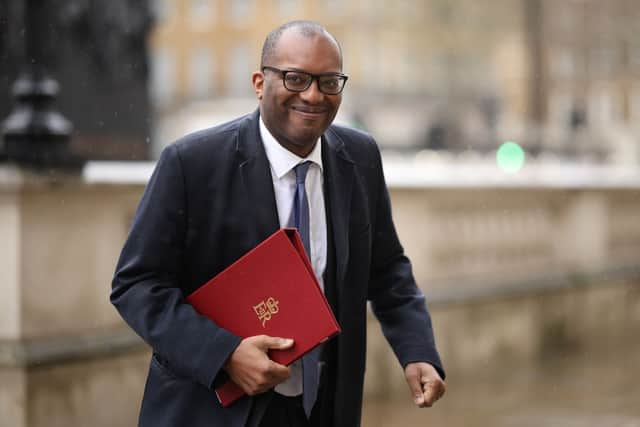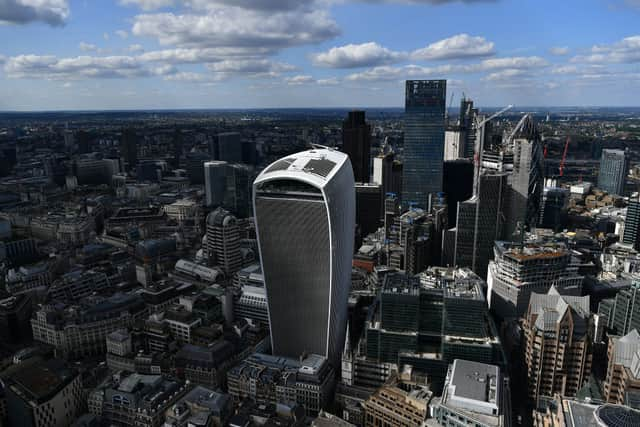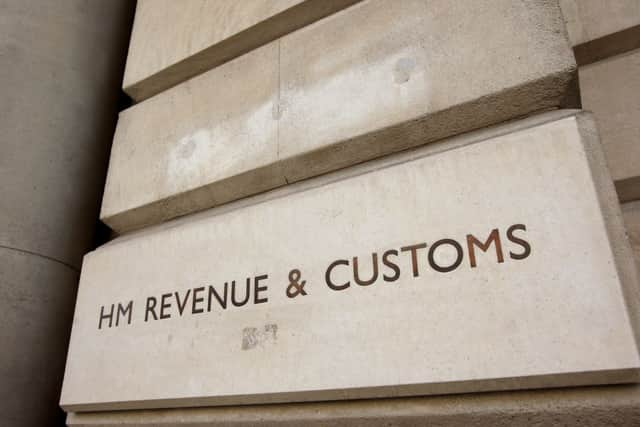What time is mini budget 2022? When does it start today - what Liz Truss’s chancellor Kwasi Kwarteng will say
and live on Freeview channel 276
Liz Truss’s plans for the UK economy are set to be formally announced by her Chancellor of the Exchequer Kwasi Kwarteng today (23 September) in what has been dubbed a ‘mini budget’.
This major fiscal event is set to outline the new government’s plans for tackling the cost of living crisis and the UK recession the Bank of England says we are already in. Not only will we find out which tax cuts the Liz Truss administration will bring in, but we will also hear how the new Prime Minister intends to pay for them.
Advertisement
Hide AdAdvertisement
Hide AdExperts believe government borrowing is likely to foot the bill for policies like the energy bills support for households and the business energy price cap. But the government believes it can all be paid for by future economic prosperity and trickle down economics.
So, when when will this fiscal event take place - and how can you follow it? Here’s what you need to know.


What time is the mini budget?
Chancellor of the Exchequer Kwasi Kwarteng will deliver a mini budget this week to lay out the tax and spend plans of the Truss government.
It is being described as a mini budget because the Office for Budget Responsibility (OBR) is not providing the analysis of the UK economy that is customary during a ‘full fat’ budget. The OBR was set up by the coalition government to provide independent analysis of the government’s economic performance.
Advertisement
Hide AdAdvertisement
Hide AdThe event will be taking place at 9.30am on Friday. MPs were meant to have gone into recess for the political party conference season but are sitting for an extra day so that the government’s policies can be scrutinised.


NationalWorld will be providing coverage of the event, while it is likely to be televised on broadcast channels, including BBC Parliament.
What will be announced in mini budget?
We do not know the exact contents of Kwasi Kwarteng’s mini budget. However, from reveals and leaks this week as well as what Liz Truss has said on the Tory leadership campaign trail, we have a fairly good idea of what will be announced.
Here is a rundown of some of the policies you can expect to hear about:
A corporation tax cut
Advertisement
Hide AdAdvertisement
Hide AdThe headline rate of tax on business profits was set to rise from 19% to 25% from April 2023 under plans set out by ex-Chancellor Rishi Sunak.
However, it is expected that this hike will now be scrapped in a bid to encourage investment into the UK.


National insurance hike reversal
Rishi Sunak also raised national insurance in his spring budget, before increasing the threshold in the summer so that the tax rise only applied to higher earners.
Kwasi Kwarteng has already announced he will reverse this tax hike, while preserving the threshold increase launched by his predecessor. Mr Kwarteng has also said he will continue to ring fence funds that will be paid towards NHS backlogs and social care.
Advertisement
Hide AdAdvertisement
Hide AdIt means the government will have to find around £13 billion a year.
Stamp duty cut
This policy was meant to be Kwasi Kwarteng’s ‘rabbit out of the hat’ - the surprise policy that would grab the attention of voters.
However, the idea has been leaked to the press in advance, and has led to warnings that it could do the opposite of what it’s meant to do - i.e. open up the housing market.
Scrapping the banker’s bonus cap
One of the more controversial policies that has been floated in the press in recent days, the Truss government is understood to want to scrap the EU law that caps bankers’ bonuses.
Advertisement
Hide AdAdvertisement
Hide AdThe policy was brought in after the 2008 Financial Crisis. However, the PM and her Chancellor are said to think it puts banks off operating in the City of London.
Experts are divided over whether it will attract more bankers to the UK. But it is the optics of the policy that might prove most challenging for the government.


At a time when inflation is eroding the pounds in our pockets, the policy might not prove popular amongst the British public. Indeed, a Survation poll of 1,189 British adults by the Child Poverty Action Group (CPAG) has found only 27% supported the idea.
Liz Truss has said she is willing to be unpopular so long as her policies achieve their aims. But, with a General Election just two years away, scrapping the cap is a politically risky move.
Low-tax investment zones
Advertisement
Hide AdAdvertisement
Hide AdAnother de-regulationary idea, Kwasi Kwarteng is expected to announce low-tax zones across England. As well as lower taxes for residents and businesses, these local authority areas will also get reduced planning restrictions and will have regulations tailored to them on a case-by-case basis.
The de-regulation may also include watered down environmental protection rules to allow for the rapid construction of new property and business developments. As well as council areas, the policy may be extended to include freeports - low-tax ‘offshore’ areas promoted by Rishi Sunak when he was Chancellor.
Mr Kwarteng is expected to argue that this policy will help the UK achieve economic growth.
What will mini budget tell us about government spending?
While the tax cut policies set to be announced by Kwasi Kwarteng will form a major part of Friday’s fiscal event, the government’s spending plans are likely to gain the most attention.
Advertisement
Hide AdAdvertisement
Hide AdLiz Truss’s energy price guarantee is expected to cost the taxpayer between £100 billion and £250 billion, meaning it will cost much more than the Covid furlough scheme (£70 billion).
The massive variation in predictions of how much it will cost is down to the volatility of the wholesale energy markets the government is intervening in. Ultimately, no one knows what will happen to prices given the uncertainty around the future of Russia’s gas exports to Europe and how cold the winter will be.


Given Liz Truss’s emphasis on cutting taxes as a way to solve the UK’s cost of living crisis and stop a recession, it is expected the huge public outlay will be paid for through government borrowing.
But with the pound struggling against the Dollar and the Euro, and with the Bank of England interest rate on the rise as it tries to curb inflation, borrowing could prove to be an expensive option for the UK.
Advertisement
Hide AdAdvertisement
Hide AdWhat we will not know is how all of these policies will affect the UK economy. At a ‘full fat’ budget event, the independent Office for Budget Responsibility (OBR) publishes an in-depth analysis of what the government’s tax and spend will mean for its economic outlook.
But Chancellor Kwasi Kwarteng has blocked the OBR’s report on the mini budget from being published - a move that has been criticised by Tory chair of the Treasury Select Committee of MPs Mel Stride.


In a pre-event analysis of what the Chancellor is expected to announce, respected think tank the Institute for Fiscal Studies (IFS) said the mini budget would be the biggest tax giveaway since Nigel Lawson’s budget in 1988.
The IFS said that despite the tax cuts and other government interventions, the average consumer would still be £500 a year worse off in real terms compared to 12 months ago.
Advertisement
Hide AdAdvertisement
Hide AdThe think tank also warned the government was setting an “unsustainable” course for the UK’s public finances as borrowing would balloon to £100 billion a year - more than double what official forecasts predicted in March.
With debt likely to be on an “ever-rising path”, the IFS said the Government’s claim that tax cuts would lead to sustained economic growth was “a gamble at best”.
Comment Guidelines
National World encourages reader discussion on our stories. User feedback, insights and back-and-forth exchanges add a rich layer of context to reporting. Please review our Community Guidelines before commenting.
